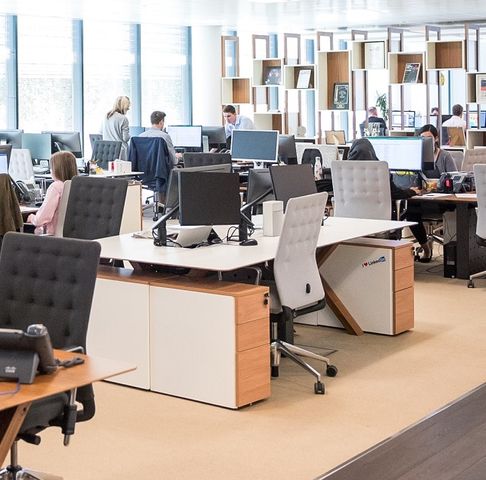Some advanced technologies seem to have been in their infancy for years, and quantum computing appears to fall into that category. However, more milestones have been achieved in recent times than many realize. 'We are on the verge of a technological revolution that can contribute to solving various societal challenges,' predicts Jesse van Doren, an innovation broker and expert in technology and innovation, in a conversation with Marc Hulzebos, innovation officer at Eurofiber. Quantum computing represents a radical departure from the traditional way computers operate. Quantum computers can perform many operations simultaneously, enabling them to solve complex calculations much faster than classical computers ever could - if they could do it at all.
Marc Hulzebos: 'Quantum computing operates completely differently from the computers we have been using so far. It offers unprecedented possibilities. Can you explain that in a few sentences to people who are not yet aware of it?'
Jesse van Doren: 'A quantum computer computes in a completely different way and can therefore process certain complex data much faster. It is seen as one of the most important innovations in the near future. A regular computer derives its computing power from bits: either a 0 or a 1. A quantum computer uses qubits: which are both a 0 and a 1 at the same time, oddly enough. A maze is a fun metaphor to explain quantum computing. A regular computer calculates one by one all the possibilities to find the exit. A quantum computer explores all possible paths simultaneously and therefore finds the exit of the maze much faster.'
Marc Hulzebos: 'At Eurofiber, we are also exploring quantum computing. However, at the moment, concrete applications seem to be still distant. How do you see that?'
Jesse van Doren: 'Of course, no one really has a crystal ball, but quantum technology is something that will have a mega impact on all sectors of the economy. And it can help solve many of our current societal challenges. We generate a lot of data every day. From tweets to photos and YouTube videos. Producing data is easy, but processing it is where it gets harder. Quantum computers are particularly suitable for this task. With quantum computing, we will be able to compute a hundred million times faster. 'Sycamore', a recent quantum project by Google, for example, calculated a complex combination of sums in three minutes and twenty seconds. According to Google, this calculation would take at least 10,000 years with a standard computer. The next step is to gain control over even more qubits and further reduce the error margin. The expected explosion in computing power can have a major impact on medicine, artificial intelligence, and science. In the Netherlands, the EU, China, and the US, significant investments are being made in quantum technology.'
Marc Hulzebos: 'We see a great potential impact of quantum computing on organizations and society as a whole. Do you share that vision?'
Jesse van Doren: 'Absolutely. It can, for example, have significant implications for pharmaceutical research. With the help of quantum computers, diseases can be better detected, and we can test the effects of certain substances. The applications of this are unprecedented. Think of personalized healthcare. Where you only receive medication based on a complex scan of DNA and genes. Certain diseases can be cured by intervening in the patient's DNA. With quantum computing, you can first try all of this without involving the patient. This way, you can see the effects of all combinations of substances on the body. With 'regular computers,' this is almost impossible: they lack speed and precision.'
'Also think of other application areas, such as meteorology, where quantum computing can analyze even more sources of weather prediction data. To accurately identify where and when bad weather will strike. Moreover, scientists could feed quantum computers with climate data from the past decades. This could enable them to build a more accurate prediction model, mapping the temperature change on Earth.'
'Quantum technology is also used in sensors that detect changes in temperature, radiation, acceleration, time, and electric or magnetic fields. These sensors stand out for their high sensitivity and resolution. This makes it possible, for example, to measure extremely small structures, such as DNA. You will encounter this next generation of sensors in, for example, self-driving cars. As a result, even under adverse environmental conditions, such as fog or smoke, they know better what is happening around them. The first systems using quantum sensors are already available. Thanks to the continuous developments in the quantum field, better navigation systems, radar systems, and medical detection techniques will become within reach in the longer term.'
Marc Hulzebos: 'Every technology has both positive aspects and downsides. Quantum computing is no different. Do you agree with that?'
Jesse van Doren: 'The enormous computing speed brings security risks. With quantum technology, in theory, you can 'crack' any encryption. Even heavily secured networks based on blockchain technology can be breached using quantum computers. Records stored with blockchain technology are public, but their owners are anonymous and protected by cryptographic keys. Cracking these keys is a complex task for traditional computers. However, for quantum systems, this is not a problem. They do it faster and easier. This potentially means a goldmine for criminals. It is certainly something we need to think about.'
Marc Hulzebos: 'We see that the Netherlands, thanks to various initiatives, in which Eurofiber is also involved, is taking a leading role in quantum technology. Can we maintain that?'
Jesse van Doren: 'We are well on our way to becoming the Silicon Valley of quantum technology. If the Netherlands can maintain a leading position in the development of a quantum computer, that offers our country enormous opportunities to become even more prosperous. Quantum technology will have a huge impact on virtually every sector and will be at the basis of many new innovations. Therefore, it is important that Dutch businesses and other parties prepare now for quantum technology. If we become the frontrunner, make the right investments, and continue to build the necessary digital infrastructure, this offers tremendous opportunities for ensuring that many innovations in the coming years will come from the Netherlands.'
The Netherlands is already doing everything to become the Silicon Valley of quantum technology. We are well on our way with initiatives such as Qutech, a research institute founded by TU Delft and TNO. There, both the theoretical aspects and the practical implementation of quantum computing are being investigated. But we do have to compete against countries like China and the United States. And the European Union also wants to become a key player in the application of quantum technology. For this purpose, the EU, for example, is investing a billion euros in an extensive research program called 'QT Flagship.''
'The American market research firm Tractica predicts that by 2025, the global market for enterprise quantum computing will be around $2.2 billion. To put that into perspective: in 2017, it was only $39.2 million. We must do everything we can to ensure that the business community and the government in the Netherlands work together so that we can reap the benefits together. This will ultimately result in more employment in the Netherlands. Governing is looking ahead. And that certainly applies when it comes to quantum computing.'

Stay informed about all developments
You receive the newsletter once per trimester.
